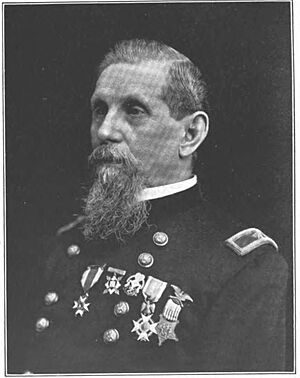Sons of the American Revolution facts for kids
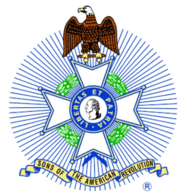 |
|
| Named after | American Revolution |
|---|---|
| Established | April 30, 1889 |
| Founded at | New York City |
| Type | Patriotic organization |
| Legal status | Federally chartered nonprofit corporation |
| Purpose | Patriotic, historical, charitable, educational |
| Headquarters | 809 West Main Street, Louisville, Kentucky, U.S. |
|
Region served
|
Worldwide |
|
Membership
|
38,323 (2022) |
|
Official language
|
English |
|
President General
|
Michael J. Elston |
| Publication | SAR Magazine Spirit of '76 |
| Affiliations | Daughters of the American Revolution Children of the American Revolution |
The Sons of the American Revolution (SAR) is a special group that helps keep the spirit of the American Revolution alive. It's also known as the National Society of the Sons of the American Revolution (NSSAR). This organization is based in Louisville, Kentucky, and was started in New York City on April 30, 1889.
The main goals of the SAR are to protect American freedom and values. They want people to appreciate patriotism, respect national symbols, and understand what it means to be an American citizen. They believe in the idea of "e pluribus unum", which means "out of many, one." This idea shows how people from many different countries came together to form one nation.
Members of the SAR are men who are descendants of people who helped during the American Revolutionary War. This includes soldiers, sailors, and even civilians who supported the fight for independence. The group works to keep American traditions strong and protect the United States Constitution. They helped make Constitution Day, Flag Day, and Bill of Rights Day official holidays. You can find SAR members in the United States and other countries like Canada, France, Germany, Spain, Switzerland, and the United Kingdom.
The Sons of the American Revolution is different from another group called the Sons of the Revolution. That group was started earlier, in 1876, by a businessman named John Austin Stevens. The founder of the SAR, William Osborn McDowell, wanted a group that was open to more people, not just a small, exclusive club.
Contents
How the SAR Began
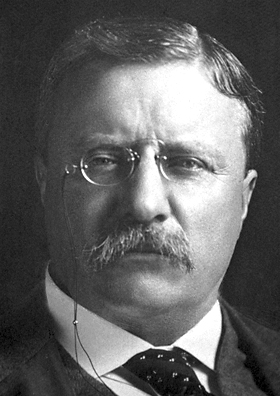
The idea for groups like the SAR started in San Francisco in 1876. A group of men, whose families were part of the Revolutionary War, met to celebrate 100 years since the Declaration of Independence. They wanted to honor the brave men and women who fought for America's freedom from Great Britain. They formed a group called the Sons of Revolutionary War Sires. While some members of this early group later joined the SAR, it wasn't a direct link.
The Sons of the Revolution, a group in New York City, was formed in 1876. Its founder, John Austin Stevens, wanted it to be a fancy social club, similar to the Society of the Cincinnati.
In 1889, William O. McDowell, a businessman from New Jersey, started the New Jersey Society of the Sons of the Revolution. However, he didn't like that all state groups had to report to the New York society. McDowell wanted a larger movement for all descendants of Revolutionary War patriots, not just an exclusive social club.
So, on April 30, 1889, McDowell started the Sons of the American Revolution at Fraunces Tavern in New York City. This was the same year as the 100th anniversary of George Washington becoming the first U.S. president. McDowell was the very first member. He also helped organize the Daughters of the American Revolution, a similar group for women whose families were part of the American Revolution.
On June 9, 1906, the Sons of the American Revolution officially received a special approval from the U.S. Congress. This act was signed by U.S. President Theodore Roosevelt, who was also a member of the SAR.
What the SAR Badge Means
The SAR's special badge looks like a Maltese cross with a wreath around it. In the middle, there's a picture of George Washington. The Maltese cross is inspired by the cross used by the Order of Saint Louis in France. The wreath represents the laurel wreaths given to heroes in ancient Rome.
The cross was chosen to honor King Louis XVI of France. He was the leader of the Order of St. Louis and gave important help to the American colonists during the war. By using this cross, the SAR wanted to remember France's help in gaining American independence.
The Maltese Cross was also used by the Knights of St. John, who were like warrior Crusaders. They fought for freedom and against unfairness. The eight points of the Maltese cross represent eight important ideas from the Bible, like being kind, peaceful, and seeking what is right.
Around Washington's picture on the badge are the words "LIBERTAS ET PATRIA." This Latin phrase means "Liberty and Country." It reminds everyone of the United States Declaration of Independence and the United States Constitution.
Members usually wear the badge on their left chest, hanging from a ribbon that is blue, white, and gold. Leaders of the society wear it on a neck ribbon. For other times, members might wear a small rosette (a flower-shaped pin) with the society's colors on their left lapel.
What the SAR Does
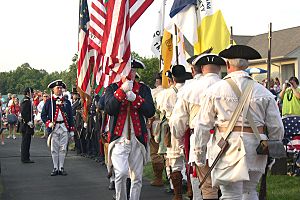
The Sons of the American Revolution does many things to honor history and educate people. They research historical events, raise money for scholarships, and give educational awards. They also work to protect important places and documents from the American Revolution. For example, the SAR asked Congress to keep Revolutionary War documents in a safe place and make them available to the public. This led to the creation of the National Archives.
The society also finds and marks the graves of Revolutionary War patriots. They have a scholarship program for Eagle Scouts. The SAR is very active in promoting patriotism. Many SAR groups have "color guard" teams. These teams dress in historical uniforms and appear at public events to share history with the community.
The Sons of the American Revolution holds meetings and a big National Congress every year. The leadership meetings are usually held in Louisville, Kentucky. The National Congress happens in a different city each summer. Recent locations have included Renton, Washington (2021), Savannah, Georgia (2022), Orlando, Florida (2023), and Lancaster, Pennsylvania (2024).
SAR Headquarters
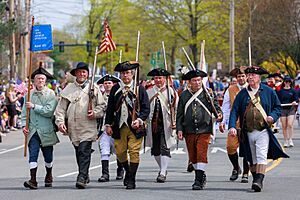
The main office of the SAR is in downtown Louisville, Kentucky. It's located in an area called Museum Row. This building has offices for the staff, a special library for family history research, and a future American Revolutionary War Education Center. The SAR is currently raising money to finish building this center. The building also displays original and copied art about the Revolutionary War, along with old uniforms, flags, documents, and other items from that time.
The SAR is run by national officers, vice presidents for different regions, and a trustee from each state and international group. These leaders meet several times a year to discuss the society's business. All members are welcome to attend these meetings and can even join committees.
The National Congress, held in late June or early July each year, is where national officers are elected. It's also where changes to the society's rules are approved. The location of the National Congress changes each year, often chosen to honor a historical event or place.
The organization also has over 60 committees that help manage different parts of the society, like facilities, insurance, and awards. Any SAR member can join these committees.
As of 2024, the President General is Darryl Addington, M.D., from the North Carolina Society. The organization's executive director is Todd Bale.
Genealogical Library
The SAR has collected family history books and records since 1889. This collection helps people research their ancestors. The library grew a lot over the years. In 2010, it moved to a new, larger building in downtown Louisville.
Today, the library has over 58,000 items. Most of these are about the Revolutionary War period, but there are also many other family history materials. The collection includes family histories, state genealogy records, census records, and applications for Revolutionary War pensions. The library also lets members use online research websites like Ancestry.com.
Who Can Join
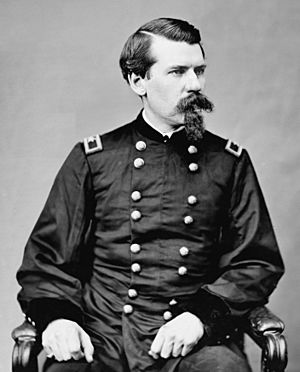
Membership in the Sons of the American Revolution is open to any male who is a "good person" and can show that he is a direct descendant of someone who actively supported the American Revolution. This means your ancestor could have been:
- A soldier or sailor in the Continental Army, Continental Navy, or state militias.
- Someone who signed the Declaration of Independence.
- A member of the Continental Congress.
- A civilian who gave weapons or supplies to the American cause.
- Someone who served in political groups supporting the Revolution, signed loyalty oaths, or helped the Patriot cause in other ways.
- Soldiers and sailors from allied countries like France and Spain who fought for American independence.
No state group or chapter is allowed to refuse an applicant because of their race or beliefs. The Sons of the American Revolution has over 37,000 members in more than 550 local groups. These groups are in all 50 states of the United States, as well as in Canada, France, Spain, Germany, Switzerland, and the United Kingdom. Since the SAR started in 1890, about 200,000 descendants have joined.
Publications
The official magazine of the SAR is called SAR Magazine. It comes out four times a year: in February, May, August, and November. The magazine shares news about the SAR at all levels and has articles about patriotic, historical, and educational topics.
Before SAR Magazine, the organization had a journal called Spirit of '76 magazine. It was published in New York starting in 1894.
Images for kids
-
Sons of the American Revolution grave marker at the Opequon Presbyterian Church Cemetery in Opequon, Virginia.
See also
- List of hereditary and lineage organizations in the United States
- List of Members of the Sons of the American Revolution
- Daughters of the American Revolution
 | Kyle Baker |
 | Joseph Yoakum |
 | Laura Wheeler Waring |
 | Henry Ossawa Tanner |


